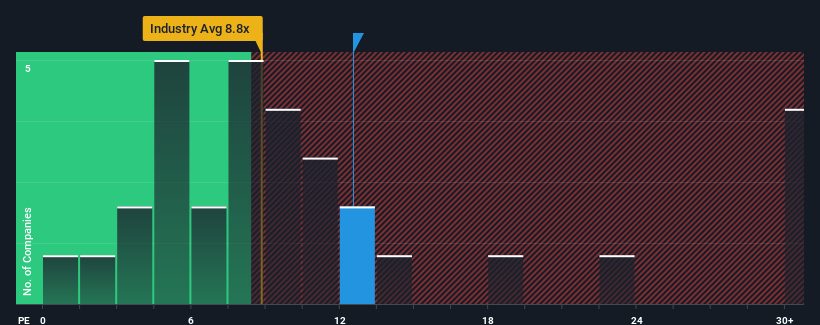Weichai Power Co., Ltd.'s (HKG:2338) Shareholders Might Be Looking For Exit

Weichai Power Co., Ltd.'s (HKG:2338) price-to-earnings (or "P/E") ratio of 12.5x might make it look like a sell right now compared to the market in Hong Kong, where around half of the companies have P/E ratios below 8x and even P/E's below 4x are quite common. However, the P/E might be high for a reason and it requires further investigation to determine if it's justified.
Recent times have been pleasing for Weichai Power as its earnings have risen in spite of the market's earnings going into reverse. The P/E is probably high because investors think the company will continue to navigate the broader market headwinds better than most. If not, then existing shareholders might be a little nervous about the viability of the share price.
Check out our latest analysis for Weichai Power

Does Growth Match The High P/E?
The only time you'd be truly comfortable seeing a P/E as high as Weichai Power's is when the company's growth is on track to outshine the market.
Retrospectively, the last year delivered an exceptional 72% gain to the company's bottom line. Despite this strong recent growth, it's still struggling to catch up as its three-year EPS frustratingly shrank by 19% overall. Therefore, it's fair to say the earnings growth recently has been undesirable for the company.
Looking ahead now, EPS is anticipated to climb by 21% during the coming year according to the analysts following the company. Meanwhile, the rest of the market is forecast to expand by 23%, which is not materially different.
In light of this, it's curious that Weichai Power's P/E sits above the majority of other companies. It seems most investors are ignoring the fairly average growth expectations and are willing to pay up for exposure to the stock. Although, additional gains will be difficult to achieve as this level of earnings growth is likely to weigh down the share price eventually.
The Final Word
Typically, we'd caution against reading too much into price-to-earnings ratios when settling on investment decisions, though it can reveal plenty about what other market participants think about the company.
Our examination of Weichai Power's analyst forecasts revealed that its market-matching earnings outlook isn't impacting its high P/E as much as we would have predicted. When we see an average earnings outlook with market-like growth, we suspect the share price is at risk of declining, sending the high P/E lower. This places shareholders' investments at risk and potential investors in danger of paying an unnecessary premium.
We don't want to rain on the parade too much, but we did also find 1 warning sign for Weichai Power that you need to be mindful of.
If these risks are making you reconsider your opinion on Weichai Power, explore our interactive list of high quality stocks to get an idea of what else is out there.
Valuation is complex, but we're here to simplify it.
Discover if Weichai Power might be undervalued or overvalued with our detailed analysis, featuring fair value estimates, potential risks, dividends, insider trades, and its financial condition.
Access Free AnalysisHave feedback on this article? Concerned about the content? Get in touch with us directly. Alternatively, email editorial-team (at) simplywallst.com.
This article by Simply Wall St is general in nature. We provide commentary based on historical data and analyst forecasts only using an unbiased methodology and our articles are not intended to be financial advice. It does not constitute a recommendation to buy or sell any stock, and does not take account of your objectives, or your financial situation. We aim to bring you long-term focused analysis driven by fundamental data. Note that our analysis may not factor in the latest price-sensitive company announcements or qualitative material. Simply Wall St has no position in any stocks mentioned.
About SEHK:2338
Weichai Power
Engages in the manufacture and sale of diesel engines, automobiles, and other automobile components in China and internationally.
Flawless balance sheet, good value and pays a dividend.

